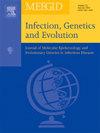Modeling and sensitivity analysis of cholera dynamics under fuzzy imprecision
IF 2.6
4区 医学
Q3 INFECTIOUS DISEASES
引用次数: 0
Abstract
This article presents a sensitivity analysis of the cholera transmission model, in which all parameters related to disease dynamics are considered as fuzzy numbers. Classical and system sensitivities of this fuzzy system have been analyzed to provide a real world approximation to cholera outbreaks. Graphical results indicate that the susceptible population is most sensitive to the new recruitment and disease-induced mortality rates of the infected and treated populations, whereas the infected population is found to be more sensitive to immune loss and disease transmission rate. The treated individuals have proven sensitivity towards the contact rate, while the recovered ones are more sensitive to the recovery and disease-induced death rates. The cumulative effect of these sensitivities with respect to induced fuzzy parameters on the model output has been reflected in the system sensitivities. As a consequence of this analysis, treatment and the disease transmission rate are identified as the most influential parameters for this newly structured model.
模糊不精确条件下霍乱动力学建模及敏感性分析。
本文提出了霍乱传播模型的敏感性分析,其中所有与疾病动力学有关的参数都被认为是模糊数。分析了该模糊系统的经典灵敏度和系统灵敏度,以提供一个真实世界的近似霍乱暴发。图形结果表明,易感人群对感染和治疗人群的新招募率和疾病引起的死亡率最为敏感,而感染人群对免疫丧失和疾病传播率更为敏感。经治疗的个体已证实对接触率敏感,而康复的个体对康复率和疾病引起的死亡率更为敏感。这些灵敏度相对于诱导模糊参数对模型输出的累积效应已反映在系统灵敏度中。作为分析的结果,治疗和疾病传播率被确定为这个新结构模型中最具影响力的参数。
本文章由计算机程序翻译,如有差异,请以英文原文为准。
求助全文
约1分钟内获得全文
求助全文
来源期刊

Infection Genetics and Evolution
医学-传染病学
CiteScore
8.40
自引率
0.00%
发文量
215
审稿时长
82 days
期刊介绍:
(aka Journal of Molecular Epidemiology and Evolutionary Genetics of Infectious Diseases -- MEEGID)
Infectious diseases constitute one of the main challenges to medical science in the coming century. The impressive development of molecular megatechnologies and of bioinformatics have greatly increased our knowledge of the evolution, transmission and pathogenicity of infectious diseases. Research has shown that host susceptibility to many infectious diseases has a genetic basis. Furthermore, much is now known on the molecular epidemiology, evolution and virulence of pathogenic agents, as well as their resistance to drugs, vaccines, and antibiotics. Equally, research on the genetics of disease vectors has greatly improved our understanding of their systematics, has increased our capacity to identify target populations for control or intervention, and has provided detailed information on the mechanisms of insecticide resistance.
However, the genetics and evolutionary biology of hosts, pathogens and vectors have tended to develop as three separate fields of research. This artificial compartmentalisation is of concern due to our growing appreciation of the strong co-evolutionary interactions among hosts, pathogens and vectors.
Infection, Genetics and Evolution and its companion congress [MEEGID](http://www.meegidconference.com/) (for Molecular Epidemiology and Evolutionary Genetics of Infectious Diseases) are the main forum acting for the cross-fertilization between evolutionary science and biomedical research on infectious diseases.
Infection, Genetics and Evolution is the only journal that welcomes articles dealing with the genetics and evolutionary biology of hosts, pathogens and vectors, and coevolution processes among them in relation to infection and disease manifestation. All infectious models enter the scope of the journal, including pathogens of humans, animals and plants, either parasites, fungi, bacteria, viruses or prions. The journal welcomes articles dealing with genetics, population genetics, genomics, postgenomics, gene expression, evolutionary biology, population dynamics, mathematical modeling and bioinformatics. We also provide many author benefits, such as free PDFs, a liberal copyright policy, special discounts on Elsevier publications and much more. Please click here for more information on our author services .
 求助内容:
求助内容: 应助结果提醒方式:
应助结果提醒方式:


